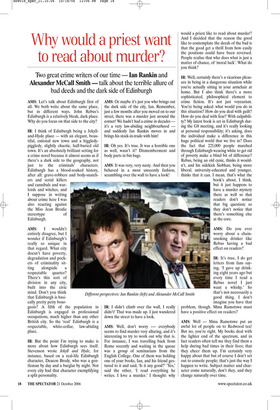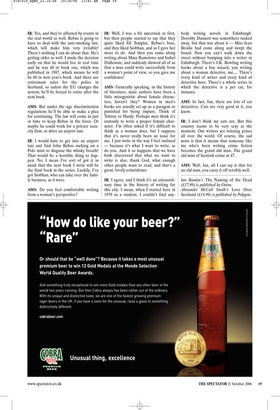Why would a priest want to read about murder?
Two great crime writers of our time — Ian Rankin and Alexander McCall Smith — talk about the terrible allure of bad deeds and the dark side of Edinburgh AMS: Let’s talk about Edinburgh first of all. We both write about the same place, but in different ways. John Rebus’s Edinburgh is a relatively bleak, dark place. Why do you focus on that side to the city?
IR: I think of Edinburgh being a Jekylland-Hyde place — with an elegant, beautiful, rational new town and a higgledypiggledy, slightly chaotic, half-buried old town. It’s an absolutely brilliant setting for a crime novel because it almost seems as if there’s a dark side to the geography, not just to the criminals’ characters. Edinburgh has a blood-soaked history, after all: grave-robbers and body-snatchers and serial killers and cannibals and warlords and witches, and I suppose in writing about crime here I was also reacting against the Miss Jean Brodie stereotype of Edinburgh.
AMS: I wouldn’t entirely disagree, but I wonder if Edinburgh’s really so unique in that regard. What city doesn’t have poverty, degradation and pockets of criminality sitting alongside a respectable quarter? There’s this sort of division in any city, built into the civic mind. Don’t you think that Edinburgh is basically pretty petty bourgeois? A fifth of the population in Edinburgh is engaged in professional occupations, much higher than any other British city. So the ‘real’ Edinburgh is a respectable, white-collar, law-abiding place.
IR: But the point I’m trying to make is more about how Edinburgh sees itself. Stevenson wrote Jekyll and Hyde, for instance, based on a real-life Edinburgh character, Deacon Brody, who was a gentleman by day and a burglar by night. Not every city had that character exemplifying a split personality. AMS: Or maybe it’s just you who brings out the dark side of the city, Ian. Remember, just a few months after you moved on to our street, there was a murder just around the corner! We hadn’t had a crime in decades — it’s a very law-abiding neighbourhood and suddenly Ian Rankin moves in and brings his stock-in-trade with him!
IR: Oh yes. It’s true. It was a horrible one as well, wasn’t it? Dismemberment and body parts in bin bags.
AMS: It was very, very nasty. And then you behaved in a most unseemly fashion, scrambling over the wall to have a look!
IR: I didn’t climb over the wall, I really didn’t! That was made up. I just wandered down the street to have a look.
AMS: Well, don’t worry -— everybody seems to find murder very alluring, and it’s interesting to try to work out why that is. For instance, I was travelling back from Rome recently and waiting in the queue was a group of seminarians from the English College. One of them was holding one of your books, Ian, and his friend gestured to it and said, ‘Is it any good?’ ‘Yes,’ said the other, ‘I read everything he writes. I love a murder.’ I thought: why would a priest like to read about murder? And I decided that the reason the good like to contemplate the deeds of the bad is that the good get a thrill from how easily the positions could have been reversed. People realise that who does what is just a matter of chance, of ‘moral luck’. What do you think?
IR: Well, certainly there’s a vicarious pleasure in being in a dangerous situation while you’re actually sitting in your armchair at home. But I also think there’s a more sophisticated, philosophical element to crime fiction. It’s not just voyeurism. You’re being asked: what would you do in this situation? How do you deal with guilt? How do you deal with fear? With culpability? My latest book is set in Edinburgh during the G8 meeting, and it’s really looking at personal responsibility; it’s asking, does the individual make a difference in this huge political world that we live in? Does the fact that 225,000 people marched through Edinburgh wearing white to get rid of poverty make a blind bit of difference? Rebus, being an old cynic, thinks it wouldn’t, and his sidekick Siobhan, being more liberal, university-educated and younger, thinks that it can. I mean, that’s what the book’s about, I think, but it just happens to have a murder mystery there as well so that readers don’t notice that big question; so they don’t notice that there’s something else at the core.
AMS: Do you ever worry about a chainsmoking drinker like Rebus having a bad effect on readers?
IR: It’s true, I do get letters from fans saying, ‘I gave up drinking eight years ago but every time I read a Rebus novel I just want a whisky.’ So that’s not necessarily a good thing. I don’t imagine you have that problem, though. Mma Ramotswe must have a positive effect on readers?
AMS: Well — Mma Ramotswe put an awful lot of people on to Redwood tea! But no, you’re right. My books deal with the lighter end of the spectrum, and in fact readers often tell me they find them a help during bad times in their lives; that they cheer them up. I’m certainly very happy about that but of course I don’t set out to console people; that’s just the way I happen to write. Subject matter and character come naturally, don’t they, and they change naturally over time. IR: Yes, and they’re affected by events in the real world as well. Rebus is going to have to deal with the anti-smoking law, which will make him very irritable! There’s nothing I can do about that. He’s getting older as well. I made the decision early on that he would live in real time and he was 40 in book one, which was published in 1987, which means he will be 60 in next year’s book. And there are retirement rules for the police in Scotland, so unless the EU changes the system, he’ll be forced to retire after the next book.
AMS: But under the age discrimination regulations he’ll be able to make a plea for continuing. The law will come in just in time to keep Rebus in the force. Or maybe he could work for a private security firm, or drive an airport taxi.
IR: I would hate to get into an airport taxi and find John Rebus sucking on a Polo mint to disguise the whisky breath! That would be a horrible thing to happen. No, I mean I’ve sort of got it in mind that the next book I write will be the final book in the series. Luckily, I’ve got Siobhan, who can take over the family business, as it were.
AMS: Do you feel comfortable writing from a woman’s perspective? IR: Well, I was a bit uncertain at first, but then people started to say that they quite liked Jill Templar, Rebus’s boss, and they liked Siobhan, and so I gave her more to do. And then you came along writing about Mma Ramotswe and Isabel Dalhousie, and suddenly showed all of us that a man could write successfully from a woman’s point of view, so you gave me confidence!
AMS: Generally speaking, in the history of literature, male authors have been a little misogynistic about female characters, haven’t they? Women in men’s books are usually set up as a paragon or punished for being impure. Think of Tolstoy or Hardy. Perhaps men think it’s unmanly to write a proper female character. I’m often asked if it’s difficult to think as a woman does, but I suppose that it’s never really been an issue for me. I just write in the way I feel inclined — because it’s what I want to write, as do you. And it so happens that we have both discovered that what we want to write is also, thank God, what enough other people want to read, and that’s a great, lovely coincidence.
IR: I agree, and I think it’s an extraordinary time in the history of writing for this city. I mean, when I started here in 1978 as a student, I couldn’t find any body writing novels in Edinburgh. Dorothy Dunnett was somewhere tucked away, but that was about it — Miss Jean Brodie had come along and swept the board. Now you can’t walk down the street without bumping into a writer in Edinburgh. There’s J.K. Rowling writing books about a boy wizard, you writing about a woman detective, me.... There’s every kind of writer and every kind of detective here. There’s a whole series in which the detective is a pet cat, for instance.
AMS: In fact, Ian, there are lots of cat detectives. Cats are very good at it, you know.
IR: I don’t think my cats are. But this country seems to be very sexy at the moment. Our writers are winning prizes all over the world. Of course, the sad news is that it means that someone like me who’s been writing crime fiction becomes the grand old man. The grand old man of Scottish crime at 47.
AMS: Well, Ian, all I can say is that for an old man, you carry it off terribly well.
Ian Rankin’s The Naming of the Dead (£17.99) is published by Orion.
Alexander McCall Smith’s Love Over Scotland (£14.99) is published by Polygon.



































































































 Previous page
Previous page